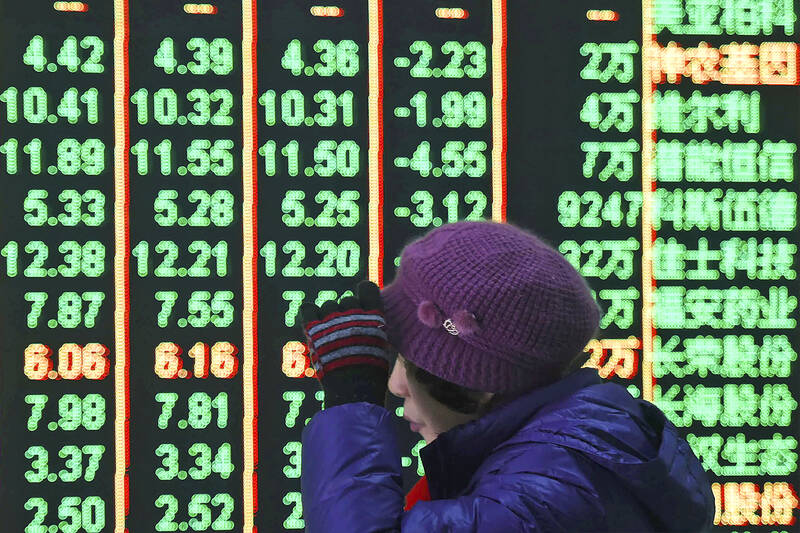Chinese shares gyrated yesterday, sinking to five-year lows, after stock market regulators sought to reassure jittery investors with a promise to crack down on stock price manipulation and “malicious short selling.”
Shares in Shanghai and the smaller market in Shenzhen, near Hong Kong, swung between big losses and small gains throughout the day. The markets have languished on the heavy selling of property shares that have suffered with a slump in the real-estate market.
Market observers said there were signs the authorities had, as is often the case, ordered big institutional investors to step up buying of state-owned banks and other heavyweights.

Photo: AP
However, shares still mostly lost ground on worries about China’s economic outlook, with traders unmoved by authorities’ pledges of support for markets.
Propping up the market with cash cannot be sustained and would not provide a lasting turnaround as long as the property sector remains weak and a weight on consumer and investor confidence, analysts and investors said, adding that the task is also massive: Chinese stocks are worth about US$9 trillion.
The main index in the smaller market in Shenzhen sank 4.4 percent, but then rapidly recovered, bouncing between losses and gains and closing 1.1 percent lower. The Shanghai Composite Index slipped 3.5 percent at one point and closed 1 percent lower, at 2,702.19 points.
Hong Kong’s Hang Seng Index slipped 0.15 percent, or 23.55 points, to 15,510.01 points.
Wilder swings were also seen on the CSI 1000 which fell as much as 8.7 percent yesterday before regaining some of the losses to close down 6.1 percent. The CSI 1000 is often used to track so-called “snowball derivatives,” which offer big gains, but also could result in exaggerated losses.
Chinese companies have lost billions of US dollars of market value as investors shifted away from the markets in Hong Kong and China in search of better returns.
The China Securities Regulatory Commission on Sunday said it would redouble enforcement of measures against crimes such as market manipulation and malicious short selling, while guiding more medium and long-term funds into the market.
That move followed other support measures such as restrictions on short-selling or reductions in trading duties in the past few days that appear to have done little to reassure investors who have been pulling money out of the markets for months.
Comments by former US president Donald Trump that he might impose a tariff of more than 60 percent on imports of Chinese goods if he is re-elected also hurt market sentiment.

CHIP RACE: Three years of overbroad export controls drove foreign competitors to pursue their own AI chips, and ‘cost US taxpayers billions of dollars,’ Nvidia said China has figured out the US strategy for allowing it to buy Nvidia Corp’s H200s and is rejecting the artificial intelligence (AI) chip in favor of domestically developed semiconductors, White House AI adviser David Sacks said, citing news reports. US President Donald Trump on Monday said that he would allow shipments of Nvidia’s H200 chips to China, part of an administration effort backed by Sacks to challenge Chinese tech champions such as Huawei Technologies Co (華為) by bringing US competition to their home market. On Friday, Sacks signaled that he was uncertain about whether that approach would work. “They’re rejecting our chips,” Sacks

It is challenging to build infrastructure in much of Europe. Constrained budgets and polarized politics tend to undermine long-term projects, forcing officials to react to emergencies rather than plan for the future. Not in Austria. Today, the country is to officially open its Koralmbahn tunnel, the 5.9 billion euro (US$6.9 billion) centerpiece of a groundbreaking new railway that will eventually run from Poland’s Baltic coast to the Adriatic Sea, transforming travel within Austria and positioning the Alpine nation at the forefront of logistics in Europe. “It is Austria’s biggest socio-economic experiment in over a century,” said Eric Kirschner, an economist at Graz-based Joanneum

BUBBLE? Only a handful of companies are seeing rapid revenue growth and higher valuations, and it is not enough to call the AI trend a transformation, an analyst said Artificial intelligence (AI) is entering a more challenging phase next year as companies move beyond experimentation and begin demanding clear financial returns from a technology that has delivered big gains to only a small group of early adopters, PricewaterhouseCoopers (PwC) Taiwan said yesterday. Most organizations have been able to justify AI investments through cost recovery or modest efficiency gains, but few have achieved meaningful revenue growth or long-term competitive advantage, the consultancy said in its 2026 AI Business Predictions report. This growing performance gap is forcing executives to reconsider how AI is deployed across their organizations, it said. “Many companies

France is developing domestic production of electric vehicle (EV) batteries with an eye on industrial independence, but Asian experts are proving key in launching operations. In the Verkor factory outside the northern city of Dunkirk, which was inaugurated on Thursday, foreign specialists, notably from South Korea and Malaysia, are training the local staff. Verkor is the third battery gigafactory to open in northern France in a region that has become known as “Battery Valley.” At the Automotive Energy Supply Corp (AESC) factory near the city of Douai, where production has been under way for several months, Chinese engineers and technicians supervise French recruits. “They